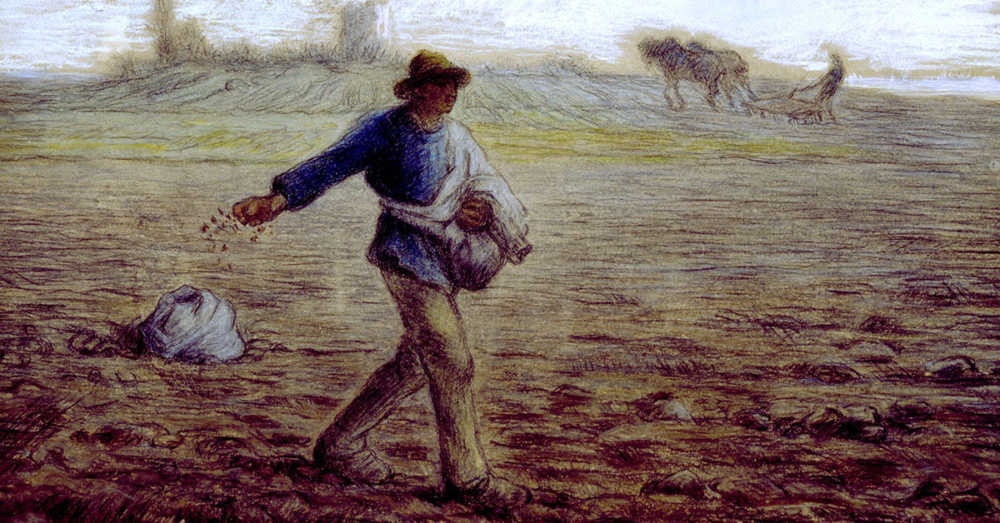We run our website the way we wished the whole internet worked: we provide high quality original content with no ads. We are funded solely by your direct support. Please consider supporting this project.

Discipleship > Politics
Article by Dan Kent
Wow. The response to my article Jesus was Not a [Socialist] surprised me! I guess it really scratched an itch for some (and touched a nerve for others). Wouldn’t it be nice if we could have all the feedback for an article before we publish it? Anyway, as I explore these ideas, I am grateful for the loving challenges of my brothers and sisters. I was flooded with brilliant feedback and important insight, and this follow-up article arises mostly out of those conversations.[1]
Clarifications
When I said “Christ was Not a Socialist,” I think many people heard: “socialism is unchristian.” This would explain why right-leaning readers loved the article and some left-leaning readers seemed defensive about it. But my point wasn’t to criticize socialism. In fact, I chose socialism as a contrast precisely because, in my opinion, its vision for community appears to be somewhat proximal to the vision of community the authors of the New Testament lay out. I confess, a person’s political philosophy means about as much to me as their Enneagram number. Not much. The only thing that really troubles me is when a brother or sister in Christ exults a political philosophy by claiming Jesus’ allegiance to it. If Jesus is our “One Teacher,” then our identity, our thoughts, and our actions must be submitted to Christ, not the other way around.
The Danger of Disengagement
Several readers pointed out a serious danger in the perspective I shared. If we put discipleship above political action, this could easily devolve into spiritualized disengagement. The call to get right with God can easily be taken as a spiritual excuse to avoid the problems of the physical world, to neglect the burdens of the oppressed, and ignore the evil in our oppressive social structures. When a person believes their problems emerge exclusively from their spiritual world, they will neglect their physical world.
I consider this a legitimate risk. In fact, this type of spiritualization has been used for centuries by oppressors to distract good-hearted people from the injustices and oppression all around them. Instead of frittering away your days on the problems of the physical world, these misguided preachers would proclaim, focus on spiritual work. It’s hard to deny that calls to discipleship like this have often led to passivity and disengagement. Yet, despite this risk, I can’t help but persist in thinking discipleship is the answer, not politics. Three reasons keep me devoted to discipleship:
First, passivity and disengagement are not the product of discipleship but the flowers of corrupt theology. Sincere discipleship always leads to action because sincere discipleship always leads to powerful fruit. Here is a small sampling of the fruit of discipleship under Jesus:
• to bear with each other (Colossians 3:13)
• to overcome evil with good (Romans 12:21)
• to flee evil desires (2 Timothy 2:22)
• to turn away from wickedness (2 Timothy 2:19)
• to live in peace (1 Thessalonians 5:13)
• to treat others better than yourself (Philippians 2:3)
• to encourage the disheartened (1 Thessalonians 5:14)
• to be patient with all (1 Thessalonians 5:14)
• to not be idle (1 Thessalonians 5:14)
• to not seek vengeance (1 Thessalonians 5:15)
• to hold on to what is good (1 Thessalonians 5:21)
• to reject every evil (1 Thessalonians 5:22)
• to lead a quiet life (1 Thessalonians 4:11)
• to control your body (1 Thessalonians 4:3)
• to forgive as the Lord forgives (Colossians 3:13)
• to love as Christ loves us (Ephesians 5:1–2)
If a community sincerely devoted themselves to learning these spiritual skills, you think slavery would have flourished in that community? Not a chance! Will a model of government teach us these skills? Not a chance! James (James 2:20) tells us the indicator of sincere discipleship: Action! Work! He also tells us the indicator of insincere discipleship: inaction!
Passivity and disengagement are not the result of discipleship. Rather, they are the primary spiritual wounds that discipleship seeks to heal. They are wounds that most often emerge from an assumption that humans are incapable of doing good. The Protestant leaders during American slavery, for instance, constructed their entire theology on a foundation of human incapability. They’d preach things like: You are a loathsome sinner, trapped in flesh, who can do nothing good unless God does it through you. When believers are convinced by such preachers that they can’t, well, they don’t. Why should they? When people believe they are incapable, they stop trying. Why wouldn’t they? Instead of taking action, they wait for God to do it for them.
Second, the cures to our social problems reside in discipleship, not political ideology—as powerful and as necessary as government might be. To see this, imagine the most perfect political system, call it Greatism. No matter how perfect and carefully thought out Greatism is as a system of government, it will fail if the citizens are wicked and selfish. Inversely, if a nation’s citizens ambitiously pursue Christlike authenticity, love, service, and sacrifice, it doesn’t matter what political system is in place, that political system will thrive, and the people will flourish.
Third, it’s when we get wrapped up in politics, not discipleship, that the risk for disengagement becomes greatest. Offering our full devotion to politics can be a way of hiding from the defects deep in our own spirit. After all, fighting for economic legislation comes far far FAR easier to us than figuring out how to get an actual homeless person to stay in our sunroom. And it’s easier to pass judgment on the treatment of war refugees over there than it is to serve the many economic refugees right here. So, political action can lead to disengagement, too. Instead of taking action, many people hope government will do their work for them.
Political Problems and Spiritual Problems
Our political problems are small compared to our spiritual problems. Consider homelessness. The state of Minnesota has about 8,400 homeless people. Meanwhile, the two biggest churches in my county have more than 10,000 Christian households.[2] Yet I know of zero Christian households that have welcomed a homeless person, or family, into their home. This is not because of capitalism or a republican government, nor is it because of student loan debt or health care costs. It’s because we have serious spiritual problems. Maybe our spiritual problem is simply that we don’t know how to develop relationships with homeless people—research has shown us that broken relationships fester at the foundation of almost all instances of homelessness. Or maybe we don’t serve the homeless in our own community because of our own selfishness (“I want my house for myself”), or maybe we’re judgmental (“they’re probably all drunks and thieves”), or maybe we’re afraid (“will they wreck my couch? get drunk and vomit on my rug?”), or maybe we’re vain (“what will the neighbors think?”).[3]
We need government, but we need discipleship more. Nationalism won’t fix my spiritual problems. Libertarianism won’t fix them. The free market won’t fix them. Imposed distribution of wealth won’t fix them. Even if the government built a home for everyone, so there were no longer homeless people, the spiritual problems that led to homelessness in the first place would persist, and would soon metastasize somewhere else in our lives.
The U.S. government abolished slavery in 1865. Great! But that simply triggered the incarceration problem we still contend with today. The 13th Amendment outlawed slavery and involuntary servitude, “except as a punishment for crime.” So the perverted spirits who once exploited slaves now simply pivoted to make as many black folks criminals as they could so they could legally steal their labor. One of the most haunting revelations in Dominique Gilliard’s book Rethinking Incarceration is the fact that the conditions and treatment of many black Americans became worse, not better, after the abolishment of slavery. A slave was property, and so had some protections. A criminal had no such protections. Many black people found themselves in a far worse, more dangerous, and less dignified situation than they ever experienced under slavery.
The only hope we have of fixing our worldly problems comes from fixing our spiritual problems, and that can only come from devoting ourselves to the right spiritual teacher.
Political Action —versus— Action with Political Consequences
The disciples called Jesus Lord. This act sent a defiant message to Caesar and also challenged the status quo of Jesus’ audience—many of whom benefitted from the power of Caesar’s government. The act of calling Jesus Lord had significant political consequences, but the disciples didn’t call Jesus Lord because they fancied these political consequences. They called him Lord because that’s who Jesus was to them.
Political groups want us to take political action. This, I have found, usually involves lobbying everyone we know about the benefits of that particular group. They want us to intrigue everyone we know with facts about why this ideology is so great. They want us to convince others to vote for our candidate, and ultimately to convert to our group. For many people, this type of abstract political activity makes up the entire scope of their philanthropic strategy. Many people don’t seem to know anything else to do. They’ve lost creativity and the capability to take initiative.
Jesus invites us into a profound communal life. This doesn’t happen on its own, nor can we outsource this life to others—to leaders, to government, to church, or even to God. We can’t wait around for someone else to do it for us. This life emerges from our cumulative agape love, which means each of us must take agape action. This might mean building people up, convincing oppressors they are causing injustice, establishing relationship with the oppressed, protecting the vulnerable, standing with victims against victimizers, teaching skills we are proficient at to people who lack them, and so forth. This might also mean pushing for a certain political candidate, or supporting a certain political cause. But as disciples, political action doesn’t have to be our only activity, or even our primary activity. We don’t need to be so pre-occupied with political propaganda, with ideological agreement, or with ideological identity.
Conclusion
When we identify Jesus as a member of our political movement, we have now made that movement an idol. When we slap our political tribe’s branding all over Jesus, we amplify our allegiance to that tribe (how could we not? Jesus is in there!). We grow deeper into that ideology while fooling ourselves into thinking we are growing deeper in Christ. In the end, I fear, we sabotage both: our political goals and our spiritual growth.
————
[1] In particular, Chuck McKnight, TC Moore, and Mark Van Steenwyk (and Mark’s online community).
[2] These numbers were pulled from simple online searches of government records and the budget reports of a couple churches in my county. They should be considered estimates.
[3] For another example, consider taxation. I believe taxation can be a vehicle for social justice. But taxation will never be a cure for social injustice. As Malaika Jabali points out, “the underlying problem is that some people just don’t care about justice” (source). Political actions will never solve spiritual problems, so we need spiritual discipleship more than we need political discipleship.
Category: Guest Contributor
Guest Contributor:

Daniel Kent has authored several books, including Confident Humility: Becoming Your Full Self Without Becoming Full of Yourself, and the series The Training of KX12. He also produces and hosts ReKnew’s Podcast Greg Boyd: Apologies & Explanations and serves as editor-in-chief here at ReKnew.org.
